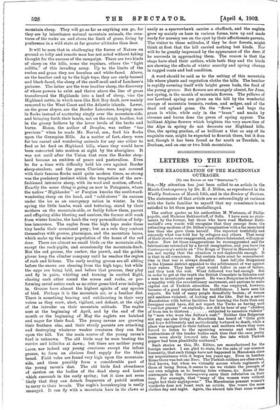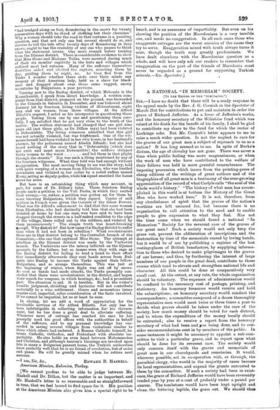LETTERS TO THE EDITOR.
THE EXAGGERATION OF THE MACEDONIAN OUTRAGES.
[To THE EDITOR OF ma" SPECTATOR:1
Sin,—My attention has just been called to an article in the March Contemporary by Dr. E. J. Dillon, as reproduced in the Weekly Scotsman of March 14th, and in the Review of Reviews. The statements of that article are so astoundingly at variance with the facts familiar to myself that my conscience is not satisfied to let them pass unchallenged.
The author quotes as his authorities M. Westman, of Philip- popolis, and Madame Bakhmetieff, of Sofia. I have seen no state- ments by the former, but those who have read Madame Bakh- metiefrs own words will recognise that they emerge from the refracting medium of Dr. Dillon's imagination with a far more lurid hue than she gave them herself. She reported truthfully and sincerely what was told her by refugees and others. That many of their stories were exaggerated, and others fabricated, will appear below. Now let these exaggerations be re-exaggerated and the fabrications retouched by a fervid imagination, and you have the Contemporary's article on "The Reign of Terror in Macedonia." I am not saying that the situation is not deplorable enough. It is that in all conscience. But certain facts must be remembered. One is that war is always dreadful. Last fall,,the Bulgarians in the Djumai district appealed to the arbitrament of war against their rulers. They knew what would follow in case of failure, and they took the risk. What followed was bad enough. Bat in order to get at the truth the British Consulate in Salonica sent a man to investigate and report. He was a Bulgarian in thorough sympathy with the revolutionary movement, and anxious to make capital out of Turkish atrocities. He was employed, however, because of a good reputation for truthfulness. I have seen his reports. He told of many people dreadfully beaten; of women and maidens violated; of looting and the like. But he, a native Macedonian with better facilities for learning the facts than any foreigner could have, did not report the Turks as having used "red-hot pincers" on anybody; nor did he hear of any "children
of from ten to thirteen subjected to nameless violence" by "men who wore the Sultan's coat." Neither this Bulgarian nor any one else living in Macedonia has heard of "little girls and boys deliberately and methodically tortured to death, while a place was assigned to their fathers and mothers where they were forced to listen to the agonising screams and watch the contractions of the tender bodies each time that the once pretty faces were slowly lowered into the fire into which Turkish pepper had been plentifully scattered."
Such stories as this, Mr. Edith; are manufactured for the foreign market. I am glad to state, for the sake of our common humanity, that such things have not happened in Macedonia since my acquaintance with it began ten years ago. Even in heathen Rome there was but one Nero. The Turkish soldiers are often cruel, God knows, but when we virtually accuse whole regiments of them of being Neros, it seems to me we violate the precepts of our own religion as to bearing false witness, ikc. Some of the statements in the Contemporary carry their refutation on their face. For example, that "many of the women were without aught but their nightgowns." The Macedonian peasant woman's wardrobe does not boast such an article. She wears the same clothes day and night. Again, the absurd tale that some women Why a woman should take the road in that costume is a puzzling question, and that not only one but several should do so, and survive to tell the tale after twenty days of floundering in deep snows, ought to'tax the credulity of any one who pauses to think
what the statement means. One more remark before turning from the Djumai district. There is considerable evidence to show that Miss Stone and Madame Ti3ilka were secreted during much of their six months' captivity in the huts and villages which suffered most last autumn. Many of the sufferers themselves doubtless aided and abatted the captors, secreting them by day, guiding them by night, &c. As they fled from the Turks I wonder whether there stole over their minds any
memory of that American lady, held as a slave for black- mail and dragged about over those same rugged, snowy mountains by Bulgarians, a year previous.
Turning now to the Razlog district, of which Mehomia is the Kamaikandik, I speak from direct knowledge. A written com- plaint from that district, prepared on the ground, was forwarded to the Consuls in Salonica in December, and was followed about January 1st by fourteen living victims of ill-treatment, eight men and six women, from three villages. At Sir Alfred Biliotti's request, I acted as his interpreter in questioning these people. Taking them one by one and questioning them care- fully, I am satisfied that he got very close to the truth of the matter. The written statement had charged that one girl nine years old (not three girls, as Dr. Dillon says) had been violated in Dobronishte. The living witnesses admitted that this girl
was not actually violated, but was frightened. One of the wit- nesses herself had been violated in her own house, in her husband's
absence, by the policeman named Abadin Effendi ; but she had heard nothing of the story that in " Dobronitsky [which does not exist and must mean Dobronishte] the soldiers stripped thirty women to the waist and led them in that plight
through the streets." Nor was such a thing mentioned by any of the fourteen witnesses. What they told was bad enough without exaggeration. The most moving thing to me was the story, told with quiet weeping, of a woman from Eleshnitza, who was hustled downstairs and violated in her cellar by a noted ruffian named lbony, acting as deputy-police, while his squad searched the house above for arms.
But here is an astonishing thing which may account, in part, for some of Dr. Dillon's tales. These fourteen Razlog people made a petition to the Vail Pasha, in which they recited their wrongs,—or, rather, a petition was gotten up for them by more knowing Bulgarians, which they. signed. Copies of said petition in French were given the Consuls of the Great Powers. What was Sir Alfred's anIazement to find that this same woman from Eleslinitza, who had distinctly told him that she had been violated at home by but one man, was here said to have been
dragged through the streets in a half-naked condition to the edge of the village, there rolled out to the soldiers, and violated by
them promiscuously ! The simple truth was heart-breaking enough. Why distort it? But how came the Razlog district to suffer thus when it had not been in rebellion? What revolutionists there are in that district belong to the Centralist branch of the Committee,—the one that captured Miss Stone. The attempt at rebellion in the Djumai district was made by the Vurhovist branch. The Vurhovists saw the misery inflicted on the Djumai peasants by the failure, but so insane were they with rage at the Razlog district for failing to lend a hand to their effort that immediately afterwards they sent bands across from Bul- garia into Razlog to incense the Turks against their fellow- Bulgarians, and so avenge themselves. This was just at the beginning of winter, when flight was cut off by snows. As soon as bands had made attacks, the Turks promptly con- cluded that there were revolutionists in the district, and began
their search for weapons, in which beatings, &c., had a prominent
part. The situation is sad. It is terrible. But in the writer's humble judgment, shrieking and hysterics will not contribute materially to a wise settlement. Grave and momentous issues require cool, impartial, sober consideration of the facts involved. If we cannot be impartial, let us at least be sane.
In closing, let me add a word of appreciation for the invaluable services of Sir Alfred Biliotti. Not only has he been indefatigable in collecting information for' his Govern- ment, but he has done a great deal to alleviate suffering. Whenever news of outrage has reached his ears he has
promptly used his good offices with the authorities in behalf of thesufferers, and to my personal knowledge has suc- ceeded in saving several villages from visitations similar to those which others had endured. A. Roman Catholic himself, he
treats Catholic, Orthodox, and Protestant with absolute im- partiality. He also holds an even hand between Mahommedan and Christian, and although heaven's blessings are invoked upon him in many a Bulgarian peasant home, the Turkish authorities know perfectly well that he is no friend of revolution, but of order and. peace. He will be greatly missed when he retires next summer.
American Mission, Sal onica, Turkey.
[We cannot profess to be able to judge between Mr. Haskell and Dr. Dillon, but the matter is so important, and Mr. Haskell 's letter is so reasonable and so straightforward in tone, that we feel bound to find space for it. His position
at the American Mission also gives him a special right to be
had trudged along on foot, floundering in the snows for twenty heard, and is an assurance of impartiality. But even on his nsecutive days with no shred of clothing but their chemises." showing the position of the Macedonians is a very terrible one, and needs no exaggeration. In all such cases those who exaggerate outrages are the worst enemies of the cause they try to serve. Exaggeration mixed with truth always turns it sour, though the truth may greatly predominate. We have dealt elsewhere with the Macedonian question as a whole, and will here only ask our readers to remember that exaggeration on the part of the friends of Macedonia must never be regarded as a ground for supporting Turkish misrule.—ED. Spectator.]











































 Previous page
Previous page